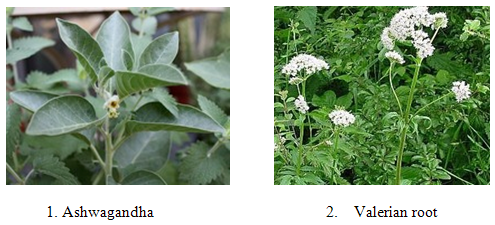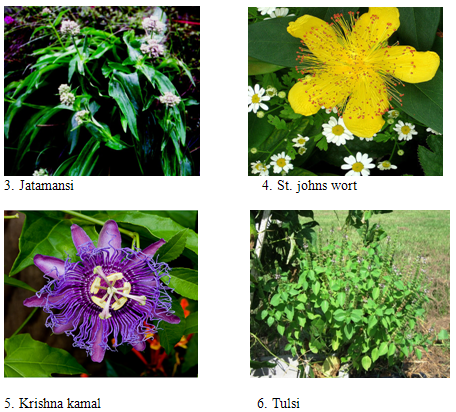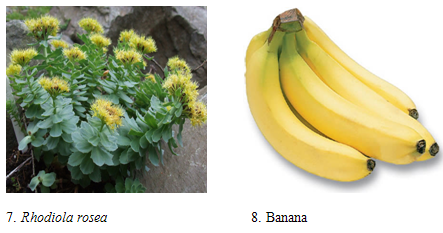 About Author:
About Author:
Bhatt Mehul K,
Asst.professor, PhD continue
Department of Pharmacognosy,
Shivam Pharmaceutical Studies & Research Centre,
Valasan-388 326, Anand-380 015, Gujarat, India.
mkb_0999@yahoo.co.in
Abstract:
Now-a-days many people of the world are suffering from anxiety, stress and depression. They experience feelings of anxiety before an important event such as exam, business deal or first date. Anxiety disorders however are illness that fills people’s lives with unreal & imaginary fear that are chronic, unremitting and can grow progressively worse. By now, most of us know that anxiety is quite a common complaint and many people have tried some of the various medications used for anxiety. But many don’t know that there are a variety of herbs available used to treat anxiety in natural way. This article includes, “What is Anxiety?” Herbs used to cure Anxiety, depression, and Stress”, and “Natural Self-Healing”.
[adsense:336x280:8701650588]
Reference Id: PHARMATUTOR-ART-1626
Introduction[1-4]:
Most people experience feelings of anxiety before an important event such as exam, business deal or first date. Anxiety disorders however are illness that fills people’s lives with unreal & imaginary fear that are chronic, unremitting and can grow progressively worse. Tormented by panic attacks, obsessive thoughts, flashbacks, nightmares, or countless frightening physical symptoms, some people with anxiety disorders even become housebound.
Different kinds of anxiety disorders:
· Panic Disorder: Repeated episodes of intense fear that strike often without warning. Physical symptoms include chest pain, heart palpitations, and shortness of breath, dizziness, and abdominal distress, feelings of unreality and fear of dying.
· Obsessive compulsive disorder: Repeated unwanted thoughts or compulsive behaviors that seem impossible to stop or control.
· Post-traumatic stress disorder: persistent systems that occur after experiencing a traumatic event such as rape or other criminal assault, war, child abuse, natural disasters, or crashes. Nightmares, flashbacks, numbing of emotions, depression and feeling angry, irritable or distracted and being easily startled are common.
· Phobias: two major types of phobias are social phobia and specific phobia. People with social phobia have an over whelming and disabling fear of scrutiny, embarrassment, or humiliation in social situations, which leads to avoidance of many potentially pleasurable and meaningful activities. People with specific phobia experience extreme, disabling and irrational fear of something that poses little or no actual danger; the fear leads to avoidance of objects or situations and can cause people to limit their lives unnecessarily.
[adsense:468x15:2204050025]
· Generalized anxiety Disorder: constant exaggerated worrisome thoughts and tension about everyday routine life events and activities, lasting at least six months. Almost always anticipating the worst even though there is little reason to expect it. Accompanied by physical symptoms, such as fatigue, trembling, muscle tension, headache or nausea.
Herbal treatment of anxiety[5-18]:
Healing anxiety with herbs has been a topic of hot debate in recent years as our ideas about wellness and natural living have begun to influence our lives. When you are for vitamin or an herb for anxiety, it can seem difficult to find good information that will help you make the right decision.
It is essential that medical intervention be sought at the earliest to avoid long term harm that extended anxiety can have overall health. These days, natural treatments for anxiety are gaining importance, of which diet and herbs form two important pillars. Clinical researches has shown that in many cases, eliminating coffee alone can in itself be a complete solution for anxiety relief. Anxiety disorders are linked to hypoglycemia as well and so those who are prone to low blood sugar levels should ensure that they reduce the consumption of simple sugars and replace them with whole grains. The addition of proteins to your diet can help in avoiding anxiety attacks. Another treatment for panic attack is gaining acceptance with people as well as the medical fraternity is herbal remedies. They essentially provide relaxing and calming effect on the human body. Since some herbal remedies may interact with other prescription drugs, it is advisable that these remedies be tried in consultation with a physician.
Herbs like kava-kava and valerian roots have been used traditionally. Kava has been shown to be effective clinically for the treatment of anxiety disorders using a dose of 300 mg kava extract per day.
The herb Valerian acts as a tranquilizer as it promotes relaxation without affecting mental alertness. Clinically minimum of 0.8% valerenic acid have been found to be highly effective.
The good news is that it is not habit forming. The other herbs used, though not tested clinically are California poppy, hops, Ashwagandha, Passion flower, Chamomile and Catnip.
Most of the herbal preparations commercially available are usually a combination of tow or more herbs i.e. polyherbal formulation.
- Winter cherry (Ashwagandha), Withania somnifera
- Valerian root (Valeriana officinalis)
- Jatamansi (Indian spike nard) Nardostachys jatamansi
- St. johns wort (Hyercium perforatum)
- Krishna kamal(Passion flower) Passiflora somnifera
- Tulsi (Ocimum sanctum)
- King's Crown(Rhodiola rosea)
- Banana (5-HTP, 5-Hydroxytryptophan)
These herbs for anxiety are either adaptogens or natural sedatives. When combined with vitamin-B complex and vitamin-C, these herbs strengthen the body’s response to stress, reducing occasional & social anxiety or panic attack.
NOW YOU CAN ALSO PUBLISH YOUR ARTICLE ONLINE.
SUBMIT YOUR ARTICLE/PROJECT AT articles@pharmatutor.org
Subscribe to Pharmatutor Alerts by Email
FIND OUT MORE ARTICLES AT OUR DATABASE
Herbs for panic anxiety attack are known to reduce the following feelings caused by everyday stress:
- Occasional anxiety and panic attack
- Nervous tension and/or irritability
- Mild to moderate mood swings caused by everyday stress
- Restlessness and intermittent sleep difficulty
- Mental and physical fatigue caused by occasional anxiety and panic attack
Herbs for panic attack and anxiety cannot diagnose, cure or treat a disorder. They may however help to promote a positive mood balance and support healthy neurotransmitter function. They also promote relaxation to lower stress, potentially reducing the instance of occasional anxiety or panic attack.
Healing anxiety with herbs is not a replacement for healthy lifestyle choices and the advice of a professional healthcare advisor. Natural herbs for panic and attack and anxiety are not approved by the US FDA to diagnose, treat, cure or mitigate a disease or disorder. Make sure to discuss all of your wellness concerns with your healthcare professional.
When used as part of a complete wellness plan, healing anxiety with herbs is one step toward anxiety relief. A wellness plan focuses on the seven aspects as an important life area that includes emotional, physical, intellectual, social, occupational and environmental aspects. When these seven aspects of wellness are brought into balance, you will feel better overall. Herbs can be a part of your physical wellness plan along with a healthy diet and regular exercise. If you are struggling with feelings of occasional anxiety, social anxiety or panic attacks, it is also important to combine natural herbs for anxiety with an emotional wellness plan. Getting to the bottom of your feelings and learning to understand your emotions is a key part of a balanced life. Remember, taking natural herbs for panic attack anxiety is only a small part of the equation. For total wellness, you must also take part in activities that support the other seven aspects of wellness.



References:
1. Rang PH, Dale MM, Ritter JM, Moore PK. Pharmacology. 5th Ed. Noida: International Print-O-Pac Limited: 217-257.
2. Harvey AR, Champ CP. Pharmacology. 2nd Ed. New York: Lippincott Williams And Wilkins: 275- 276.
3. Alprazolam/kava interaction. Psychiatry Drug Alerts: Feb 1997; 11(2):10-11.
4. Beau, George. Chinese medicine. New York, NY: Avon Books; 1972.
5. Castellanos, Julie, Nathan, Joseph, Rosenberg, Jack, Drugs and herbs: do they mix. Drug Topics May, 2000; 35. Chen, John, Recognition and prevention of herb-drug interaction.
6. Goulart, Frances Sheridan. The abc's of botanicals: An interview with mark blumenthal. Alternative & Complimentary Therapies 1997; 3(5):344-349.
7. Diagnostic and statistical manual of mental disorders: DSM-IV. 4th ed. Washington, DC: American Psychiatric Association; 1994: 327(341) 432-436.
8. Lake, James L. Psychotic medications from natural products: A review of promising research and recommendations. Alternative Therapies 2000; 6(3):36-60.
9. Martindale - The extra pharmacopoeia. Royal Pharm. Society, GB. Vol.84: 1995.
10. chopra.com/ashwagandha
11. lef.org/magazine/mag2006/jun2006_report_ashwa_01.htm
12. science20.com/news_releases/common_herb_ashwagandha_plus_cows_milk_boosts_immunity_says_study
13. Dhawan K, Kumar S, Sharma A. Aphrodisiac activity of methanol extract of leaves of Passiflora incarnata Linn. in mice. Phytother Res 2003; 17:401–403.
14. en.wikipedia.org/wiki/Valerian_(herb)
15. Chatterjee B, Basak U, Datta J, Banerji A, Neuman, T. Prange. Studies on the Chemical Constituents of Nardostachys jatamansi DC (Valerianaceae). Cheminform 2005; 36:17.
16. Hoerster H, Ruecker G, Tautges J. Valeranone content in the roots of Nardostachys jatamansi and Valeriana officinalis. Phytochem 1977; 1:1070-1071.
17. Beaubrun G & Gray GE: A review of herbal medicines for psychiatric disorders. Psychiatr Serv 2000; 51(9):1130-1134.
18. Kumar V., Andola H.C., Lohani H. and Chauhan N. (2011). Pharmacological Review on Ocimum sanctum Linnaeus: A Queen of herbs. J of Pharm Res, 4:366-368.
NOW YOU CAN ALSO PUBLISH YOUR ARTICLE ONLINE.
SUBMIT YOUR ARTICLE/PROJECT AT articles@pharmatutor.org
Subscribe to Pharmatutor Alerts by Email
FIND OUT MORE ARTICLES AT OUR DATABASE









